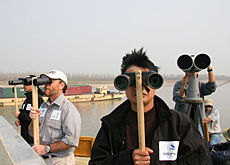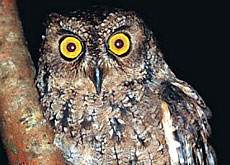Conservationist mourns lost Yangtze dolphin

A Swiss conservationist says a dolphin unique to China's River Yangtze is almost certainly extinct after an international expedition ended without a sighting.
August Pfluger said the baiji – traditionally thought by the Chinese to be a river god – had been driven to extinction by the destruction of their habitat, illegal fishing and collisions with ships.
“We have to accept the fact that the baiji is functionally extinct. It is a tragedy – a loss not only for China, but for the entire world,” he said in a statement.
Pfluger, who founded an organisation to save the mammal, said that while a few of the white, nearly blind freshwater dolphins might still exist, there were unlikely to be sufficient numbers to breed and ward off extinction.
“If there are maybe one or two or three left in the river, we don’t believe that they have any chance to survive. We were obviously too late. For me, it’s a tragedy in terms of conservation. We lost the race.”
Pfluger was co-leader of an expedition of 30 scientists who spent the past six weeks searching a heavily trafficked 1,700-kilometre stretch of the Yangtze, where the baiji once thrived.
The expedition’s two research boats used high-performance optical instruments and underwater microphones. The team included experts from the Swiss Federal Institute of Aquatic Science and Technology.
During the expedition, scientists from the Dübendorf-based institute tested the water quality of the Yangtze to see whether pollution might have influenced the dolphin’s decline.
Although they found a high degree of pollutant build-up, there were no indications of high concentrations of toxic substances.
Few sightings
Around 300 baiji were believed to be living in the Yangtze in the 1980s, but the last survey in 1997 yielded just 13 sightings.
The last confirmed sighting was by a fisherman in September 2004. QiQi, a dolphin male, who was rescued in 1980, died four years ago at the Institute of Hydrobiology in Wuhan.
The Chinese government set up a reserve in a lake in central Hubei province to look after captured baiji, but failed to find any.
“The strategy of the Chinese government was a good one, but we didn’t have time to put it into action,” said Pfluger, who has only once seen a baiji in the wild, in 1997.
“I think in the past few years the government has put more attention on the issue, but we have all been too late,” he added.
With the baiji gone, Pfluger said his foundation would now turn to teaching sustainable fishing practices and trying to save other freshwater dolphins.
These include another threatened species, the Yangtze finless porpoise, of which the expedition counted fewer than 400.
Pfluger noted that 28 finless porpoises were “doing well” at the baiji reserve and even breeding. “We must redouble our efforts to save the Yangtze finless porpoise too,” he said.
swissinfo with agencies
The expedition was led by the Chinese Ministry of Agriculture and brought together experts from the Swiss Federal Institute of Aquatic Science and Technology, the National Oceanic and Atmospheric Administration, the Hubbs-SeaWorld Research Institute of San Diego and Japan’s Fisheries Research Agency.
The Swiss Agency for Development and Cooperation was one of the expedition’s major project partners. Victorinox, Pictet & Cie, and Kuehne + Nagel were among its sponsors.
The baiji, shy and nearly blind, is one of the world’s oldest dolphin species, dating back some 20 million years.
Scientists believe their disappearance would be the first instance of a large aquatic mammal being driven to extinction since hunting killed off the Caribbean monk seal in the 1950s.
The baiji is related to other freshwater species found in the Mekong, Indus, Ganges and Amazon rivers.
Chinese view the dolphin as the reincarnation of a princess who refused to marry a man she did not love and was drowned by her father for shaming the family.

In compliance with the JTI standards
More: SWI swissinfo.ch certified by the Journalism Trust Initiative



You can find an overview of ongoing debates with our journalists here. Please join us!
If you want to start a conversation about a topic raised in this article or want to report factual errors, email us at english@swissinfo.ch.